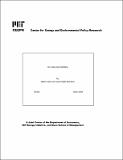| dc.contributor.author | Montero, Juan-Pablo | |
| dc.contributor.author | Liski, Matti | |
| dc.date.accessioned | 2009-06-29T19:10:18Z | |
| dc.date.available | 2009-06-29T19:10:18Z | |
| dc.date.issued | 2009 | |
| dc.identifier.issn | 2009-003 | |
| dc.identifier.uri | http://hdl.handle.net/1721.1/45665 | |
| dc.description.abstract | It has been long recognized that an exhaustible-resource monopsonist faces a commitment problem similar to that of a durable-good monopolist. Indeed, Hörner and Kamien (2004) demonstrate that the two problems are formally equivalent under full commitment. We show that there is no such equivalence in the absence of commitment. The existence of a choke price at which the monopsonist adopts the substitute (backstop) supply divides the surplus between the buyer and the sellers in a way that is unique to the resource model. Sellers receive a surplus share independently of their cost heterogeneity; a result in sharp contrast with the durable-good monopoly logic. The resource buyer can distort the equilibrium through delayed purchases, but the Coase conjecture arises under extreme patience (zero discount rate). | en |
| dc.description.sponsorship | Massachusetts Institute of Technology. Center for Energy and Environmental Policy Research. | en |
| dc.relation.ispartofseries | MIT-CEEPR;09-003WP | |
| dc.title | On Coase and Hotelling | en |
| dc.type | Working Paper | en |
